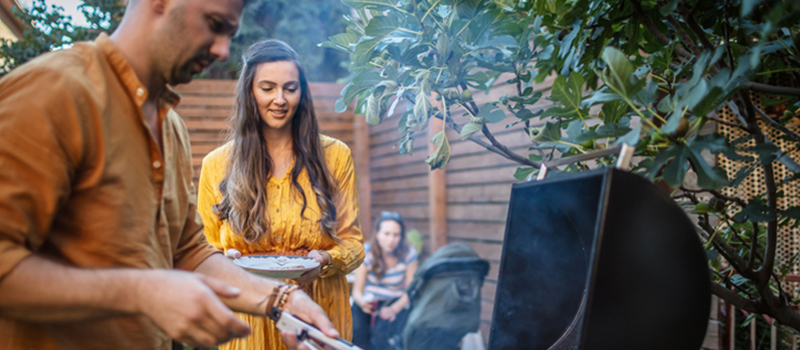Summer Grilling Safety Tips
Summer Grilling Safety Tips

Summer Grilling Safety Tips
Grilling Preparation
- Excess grease and debris can be a serious hazard. Before you light your grill, be sure to thoroughly clean it, including the grease trap. If you have a charcoal grill, empty out any ashes. Scrub your grill with a stiff steel brush and wipe it down with a wet cloth.
- If you have a gas grill, inspect the hose that connects to tank to the grill. Make sure there is no damage to the hose, and replace it if necessary. If you haven’t used your grill for a while, it might not hurt to check for a gas leak. Most importantly, never turn on the gas when the lid is closed. Gas can build up under the lid, and lighting it can result in a dangerous fire ball. If you are cooking food and start to smell gas suddenly, turn off the burners and tank immediately.
- Make sure you grill in a safe space. Place your grill on a stable surface, away from flammable items like branches, fences or sheds. Be sure your grill isn’t too close to your home, in case flames flare unexpectedly. Keep children and pets away from the grill, and never leave your grill unattended. Fires can start quickly, so it’s important to always keep an eye on it.
- Prepare for anything, including a fire. In the event of a grease fire, having a fire extinguisher handy can be crucial. Throwing water on a fire might be your first instinct, but adding water to a grease fire can be disastrous and cause the fire to spread. If you don’t have a fire extinguisher handy, baking soda can also help put out a grease fire.
- If the flame on your gas grill goes out, turn it off and wait at least five minutes before relighting. If you’re using a charcoal grill, never add lighter fluid once your coals are smoldering or glowing.
- Don’t overload your grill. Not only will it take much longer to properly cook your food, but you run the risk of excess fat dripping off and causing a flare-up.
- When you’re finished grilling, turn the grill off and close the lid and vents. Never move the grill or remove the coals until they’ve cooled completely. On a gas grill, be sure that the valve is closed tightly when not in use.
- If you’re using a charcoal grill, soak the coals with water to make sure they’re completely cool and inactive. Once they have cooled, dispose of them in a metal container.
- When your grill is not in use, be sure to cover it. This will prevent excess debris and insects from getting in, and will keep it clean for the next use.
What is covered under my homeowners insurance?
In the rare event that your grill fire gets out of control, most homeowners insurance policies cover at least some types of damage. Be sure to check the details of your own homeowners policy to make sure you know what is and isn’t covered, as it does vary between policies and insurance companies. Generally speaking, standard policies usually cover the following:
- Damage to the house itself
- Damage to personal possessions, like lawn furniture
- Damage to insured structures on your property, such as a gazebo or shed
- Injuries to a guest, covered under the liability portion of the policy
Taking a few extra steps before you start grilling can help ensure that you have a successful, fun outdoor event, but even the most diligent grill master can’t prepare for everything. In the event that an unexpected fire causes damage, you’ll want to be sure you have the right coverage to keep your home protected. If you’re unsure about whether your homeowners coverage is right for you or need more info on what kind of damage your current policy covers, reach out to your local agent for more info. They’ll be happy to answer any questions and make sure you have the coverage you need to feel secure.
